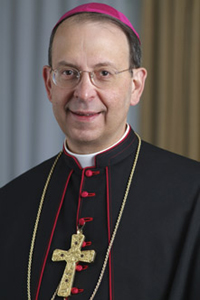By Kilian Melloy
EDGE Boston
Jun 10, 2009
http://www.edgeboston.com/index.php?ch=news&sc=&sc2=news&sc3=&id=92362
An attempt by the state of Connecticut to exert control over the finances of Catholic dioceses in that state has been decried as revenge by lawmakers there for the church's role in shaping marriage equality legislation.
Red State.com reported in a June 5 article that state Senator Andrew McDonald sponsored a bill to bring the Catholic church's finances into the state's purview.
State Rep. Michael Lawlor sponsored the bill in the house.
When the church protested, with priests urging their parishioners to contact state lawmakers, the Office of State Ethics began to look into whether those clerical urgings constituted a violation of lobbying laws.
 |
| Bishop William Lori: well-organized protest by 3,500 a "spontaneous" affair Photo by |
According to a letter written by a Connecticut Bishop, William Lori, the church was also told that its urging of parishioners to contact legislators over the issue of marriage equality was also cited as a violation of state lobbying laws.
Religious and social conservatives have been hasty to assert that the entire episode is rooted in lawmakers taking revenge for the church having earlier lobbied to ensure that a "conscience clause" exempting the church and its clergy from marriage equality would be part of the law that allows for gay and lesbian family parity.
"The subtext to all this is that the underlying legislation itself appears to be retaliation for the Church's opposition to same-sex marriage (Sen. McDonald and lead Connecticut House sponsor Rep. Michael Lawler are both gay)," the article at Red State ventured.
Anti-gay religious site LifeSiteNews led with that assumption in a March 9 article, referring to accusations that the bills was "payback" for the church's stance on marriage equality.
The bill seeks "To revise the corporate governance provisions applicable to the Roman Catholic Church and provide for the investigation of the misappropriation of funds by religious corporations." The rationale offered by McDonald and Lawlor references the embezzlement of nearly one and a half million dollars by a Connecticut Catholic priest.
The charges of lobbying violations stem in part from the money spent by the church on a rally that saw more than 50 buses full of Catholic protesters arrive in the state's capitol on March 11.
The Office of State Ethics requires "registration and reporting" of lobbyists amounts in excess of $2,000 spent on efforts to influence lawmakers' decisions, noted a June s article at The Stamford Advocate.
Moreover, the diocese was not registered as a lobbyist; spending more than $2,000 on lobbying activity requires such registration.
Despite the level of organization and preparation that went into the mass transport of over 3,500 Catholic demonstrators on that day, Bishop Lori was quoted by The Advocate as saying that the rally was "spontaneous."
And while those critical of the investigation cry foul on Constitutional grounds, the church may indeed have violated state law, the article indicated.
Even so, the bill and subsequent investigation were characterized as a bid to "muzzle" the state's Catholic leaders by The Washington Examiner.com in a June 9 article.
The article claimed that a similar lobbying offense might well have been committed by the church when the church's Web site featured a note urging the faithful to contact the state's governor and ask for the death penalty to be stricken from the books. (The article did not say whether the posted text had involved costs exceeding $2,000.)
The Examiner article referred to state lobbying regulations as a "weapon" being deployed against the church, suggesting a larger battle was being played out.
According to The Examiner, the marriage equality issue was directly involved.
"First, the Bridgeport Diocese fought to ensure that a law instituting gay marriage included a provision protecting the right of churches to set their own rules," the article read.
"In effect, the church wouldn't resist gay marriage as long as nobody would force the church to conduct or recognize gay marriages."
The article noted that the Web page for the diocese called on the faithful to contact lawmakers in support of the "conscience-protection amendment."
Suggesting a direct link, the article continued, "But the state soon grabbed for the church's purse strings."
The rally, the article noted, proceeded as planned, even though the bill was withdrawn the previous day.
The diocese, which faces expensive fines, has sued in federal court.
Any original material on these pages is copyright © BishopAccountability.org 2004. Reproduce freely with attribution.